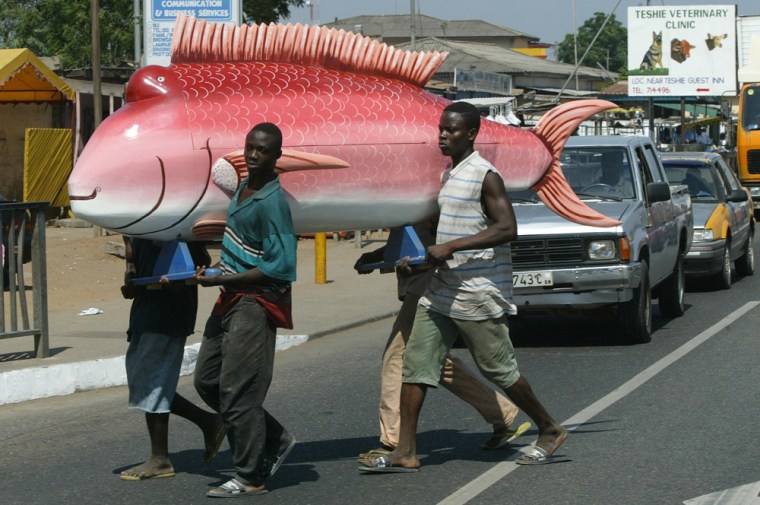The day before his mother’s funeral, Donald Rockson had a last-minute change of heart about her Bible-shaped coffin.
He had wanted the coffin to reflect his mother’s position as a devout churchgoer in this suburb of Accra, Ghana’s capital.
“She is a church elder so it should be a Bible in which she is buried,” he explained. “But the coffin was not nice, it was not presentable.”
Ditching the Bible idea, his search for the perfect coffin brought him to Daniel Mensah’s coffin shop.
Rockson, who has saved a video of his mother lying in state on his mobile phone, comments with approval as Mensah and his apprentices pin silk and fix crosses and roses to an ornate white coffin, just minutes before the funeral is due to start.
Gives confidence, pride
Funerals are important social occasions in this West African country and elaborate, brightly colored coffins have become an art form.
Most customers give Mensah more time than Rockson but all want to give their loved ones a fitting send-off in a coffin that honors who they were and what they did.
Fantasy coffins shaped like Coca-Cola bottles, chickens, cars, cameras, birds and Bibles are all on sale in Teshie.
First popularized in the 1950s, the coffins cost between $300 and $800 in a country where many live on barely $2 a day.
Some say the coffin represents an aspiration, or pride in the achievements of a short earthly stay in a poor country.
“If you can’t acquire it, you can at least be buried in it,” said Kwame Labi, a research fellow at the University of Ghana’s Institute of African Studies.
“It is born out of economic crisis, out of trying to build confidence and pride in what life you have.”
Fitting farewell
In many African countries, rich funeral traditions have been eroded by poverty and the prevalence of HIV/AIDS, but Ghana’s stability and the relative prosperity in the world’s second largest cocoa exporter have helped preserve these traditions.
Most weekends, funeral parties are held across the former British colony. In some towns, large billboards advertise the time and place of the “homecoming” or “farewell”, usually accompanied by a picture of the deceased.
Other people take out full-page national newspaper advertisemens, inviting all to the funeral, but the most vivid expressions of this commitment to saying goodbye are the fantasy coffins.
Farmer Christoph Miensa Kofi Azornu harvested palm fruits and tapped palm trees, distilling their content into a popular local gin called akpeteshie.
When he died earlier this year aged 82, his 12 children agreed he should be buried in a palm fruit-shaped coffin.
“Our father is dead.... He will be buried once and for all. However expensive it is, we feel that is the last way of according him respect,” his son Ruben Kumah said.
“He lived all his life on his palm oil plantation, he loved that profession,” Kumah added.
Good coffin prevents bad spirits
Thousands of people are expected to attend the three-day funeral in the Volta Region. Kumah and his siblings are making sure enough palm trees are uprooted to provide akpeteshie for all the guests.
For Kumah, the coffin says what a thousand words could not.
“This is an illiterate community. There are no articles or magazines written about him. We feel ... that with the provision of a coffin like this, everybody who sees it will know.”
Buying a good coffin also offers a chance, some believe, to calm an angry spirit, who could wreak havoc from the next world.
In many African communities, Christian faith often co-exists with traditional beliefs in a world of spirits.
Brigid Sackey, a professor in the University of Ghana’s African Studies department, explained the reasoning.
“The dead person is a spiritual being. He has more power than we have. If we send you off in style, you won’t send disaster, drought or famine back,” Sackey said.
For others, fantasy coffins are a unique art form.
International collectors and museums sometimes snap up elaborate examples, paying up to $2,000 per item, a price justified by the use of more expensive wood.
It’s not just the money that coffin makers like veteran Paa Joe, who spends weeks shaping, sandpapering and polishing his works, find attractive.
“It can take a few weeks to get the shape complete and then it is in the grave. It is better to have it in the gallery or museum and then everyone will see it,” he laughs.
